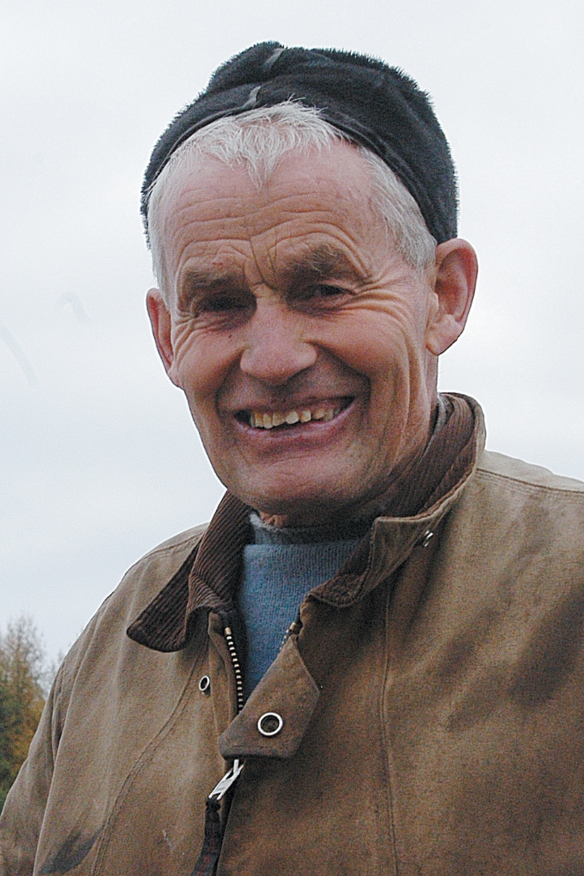
This photo of Dad was taken just a short time before he died in December 2004. It was taken by Lance Crossley, then a reporter with the Minden (Ont.) Times, who did a really nice feature story on Dad?s project of building stone fences at the family farm. We thought Lance?s photo did a wonderful job of showing the real Wendell, and we placed it on Dad?s casket at the funeral visitation. I also used it to accompany the piece I wrote about him for the Globe and Mail?s Lives Lived column.
I?ve mentioned my father, Wendell Sedgwick, many times in the months since I started this blog, starting with explaining that the whole reason I grew up in the Manse in Queensborough was that Dad was the minister at the United Church of Canada?s Queensborough Pastoral Charge between 1964 and 1975. But I feel that despite all the references, I haven?t really said very much about him. It?s oddly difficult; Dad meant so much to all of us in his family, and when we talk about him amongst ourselves we don?t have to recount what he was like. It is deep shared knowledge, something that unites us without having to be voiced. So how to voice it?
Today, the day that would have been Dad?s 81st birthday, I wanted to try.
I thought I could at least start by sharing this piece I wrote for the Lives Lived column in The Globe and Mail. It was published on June 28, 2005, a little over six months after Dad?s death. I found it difficult to write, but I felt I owed him that small tribute. And I knew he would have been pleased, because he was a devoted lifelong reader of (and frequent letter-writer to) The Globe. Here it is.
Farmer, forester, minister. Born Aug. 29, 1931, on the family farm near Gelert, Ont. Died Dec. 11, 2004, on the family farm, in an accident, aged 73.
?So much to do and so little time in which to do it.? Anyone who knew Wendell Sedgwick well had heard him say that hundreds of times. He always said it in a sad way ? mournfully, really. Work was the defining theme of Wendell?s life. He knew he could never finish all that he felt he had to do. But he never stopped trying.
In his mid-20s, he left the farm to attend the University of Toronto and become a United Church of Canada minister. He seemed to feel an urgency to do as much with his life as he could. He had probably thought a lot about the parable in which Jesus tells his listeners it is their Creator?s will that they make the most of the talents they have been given.
Wendell had talents in abundance. He read voraciously, and had a startling memory for what he had read. He could recite poetry by heart from an apparently bottomless repertoire. (He also made up poems, generally funny ones, on the spot, never having to pause to think about what the next line would be.) He had shone in all subjects at school. And he was athletic, tall and strong.
For most of his 33-year ministry in rural central Ontario, Wendell conducted three services each Sunday. He was a commanding presence in the pulpit, uncompromising in his faith and his sense of right and wrong. But he was never self-righteous. He once told a newspaper reporter: ?I know my own failings and preach to that, and the people usually have some of the same feelings.? And just as he preached a God of love and forgiveness, he was slow to judge others, always looking for (and generally finding) the best in people.
It must have helped in his ministry that, because of his farming background, he understood the life his parishioners led. His visits to people?s homes in his capacity as clergyman were more than likely to end in a discussion of what to do about a sick calf or troublesome piece of equipment. He was someone people naturally turned to in time of need, and not just spiritual need.
Ever since he had left home for university, there had been the question of who would maintain the Sedgwick farm. The answer turned out to be: Wendell. Throughout his ministry, every July (officially his ?vacation?) plus two days a week whenever possible the rest of the year, he was there, working from dawn until long after dark, trying to do in a few hours and weeks what it would take anyone else the full year to accomplish.
When he ?retired? in 1997 he could devote himself full-time to the farm. He built up his herd of beef cattle. He spent a lot of time in the bush, clearing out dead and dying trees (to make way for new, healthier growth) and turning them into lumber on his sawmill. He made maple syrup. He plowed and planted and harvested. He built a fence of the stones from his rocky fields.
Wendell?s sudden death was a wrenching blow to his family and a wide circle of friends, neighbours and former parishioners. He was a person to whom many looked for wisdom, guidance and help, and it was ? and is ? hard to imagine life without him. But none who knew him, especially his children, will forget the lessons he taught through example, about being honest and generous, and always doing your best, and working hard.
And there is an odd but real comfort in the fact that when he died, he was doing what he always wanted to be doing: working on the farm.
Katherine is the eldest of Wendell?s four children.
Like this:
Be the first to like this.
No comments:
Post a Comment
Note: Only a member of this blog may post a comment.